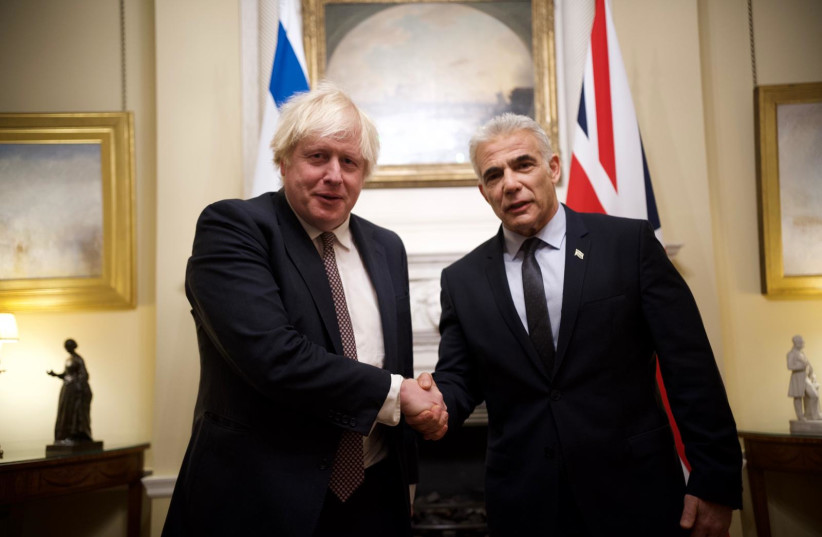The negotiations for Iran to return to compliance with its nuclear deal with world powers will not come to a good result for Israel, but Jerusalem is trying to mitigate the damage, Foreign Minister Yair Lapid said on Monday, as talks were set to continue in Vienna.
“The prime minister, defense minister and I said that we are not against any agreement; a good deal is a good thing,” Lapid said at a press briefing. “There is an intense discussion of what a good deal entails. In that discussion, we are at the table. The world, including the involved parties, is listening – including this morning.”
Lapid, however, said the Vienna talks “won’t reach an optimal result as far as we’re concerned, but we are always working with the people involved to improve the result for Israel.”
Those discussions will bring “a lot of small achievements, not a big one” for Israel, he predicted.
In contrast with Lapid, National Security Adviser Eyal Hulata told the Knesset Foreign Affairs and Defense Committee that even though Iran is using nuclear blackmail, he believes the international community is united and determined and will force greater strategic concessions from Iran than in the past.

Lapid said Israel has successfully gotten the world to pay attention to the Iranian nuclear threat and negotiations.
“At the beginning, [the Americans acted] like ‘let’s get this over with and move to the really important thing, China,’” Lapid said. “That’s not what’s happening now. It’s a central issue.”
Lapid was confident that the other parties to the talks – the UK, France, and Germany, as well as Russia and China more than in the past – are taking Israel’s position seriously.
“We feel we succeeded to some extent – I don’t want to exaggerate – to get the world to listen to us,” he said.
Israel has maintained that, while it is working to influence its process, it is not committed to the agreement and has the freedom to act, a senior diplomatic official with knowledge of Israel’s engagement on the Iran talks said, echoing public statements by Prime Minister Naftali Bennett.
Israel’s main goal is to prevent funds flowing into Iran through the removal of sanctions and other means, the source said.
The official gave an example of the US wanting to release over $7 billion that Iran has in South Korean banks, saying it would go to humanitarian aid, whereas Israel argued that money is fungible and in the end, that would cause an influx of funds to proxies in Iraq and Syria in addition to Iran’s nuclear program.
When it comes to the progress in Iran’s nuclear program, Israel has been able to rely on its allies, the source said, citing UK Foreign Secretary Liz Truss as a strong voice on the matter.
In addition, Israel has constant discussions about the Iranian threat that is beyond the scope of the JCPOA (Iran nuclear deal), such as its missile program and sponsorship of terrorism.
As for an interim agreement, Israel is concerned that it would still leave Iran weeks away from nuclear breakout.
Referring to American diplomats calling such an agreement – by which the US would provide some economic relief while the Iranians froze its nuclear program – different names like “less for less,” “freeze for freeze,” or an interim agreement, the source compared it to the Jewish custom of renaming a sick baby in hopes that the evil eye will be confused and the child will get well.
World powers’ negotiations with Iran were set to resume on Monday, after a break for New Year’s weekend.
The five nuclear states involved in the talks – China, France, Russia, the UK and the US – issued a joint statement that they “consider the avoidance of war between nuclear-weapon states and the reduction of strategic risks as [their] foremost responsibilities.”
“We affirm that a nuclear war cannot be won and must never be fought,” the joint statement reads.
In addition, they said that they “believe strongly that the further spread of [nuclear] weapons must be prevented” and said they remain committed to their Nuclear Non-Proliferation Treaty obligation “to pursue negotiations in good faith on effective measures relating to cessation of the nuclear arms race at an early date.”
In recent rounds of talks, Western diplomats expressed frustration that Iran demanded the removal of all US sanctions from recent years, without agreeing to concessions on its nuclear program, while advancing its uranium enrichment as negotiations took place.
Iranian Foreign Ministry Spokesman Saeed Khatibzadeh claimed at a press conference on Monday morning that the West retreated from its “maximalist demands.”
That language echoed comments by Russian Envoy to the Iran talks Mikhail Ulyanov that the Islamic Republic had backed down from its “maximalist demands.”
“We have made progress in four areas of verification, guarantees, lifting of sanctions and nuclear issues – in some areas more, in some areas less,” Khatibzadeh said. “Little progress has been made in areas related to the other side’s commitments.”
Khatibzadeh also confirmed that negotiations with the US have continued to be indirect, with diplomats not speaking to one another, but they have passed written texts through interlocutors.
